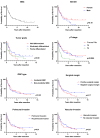A Single-Center Analysis of Patient Characteristics and Overall Survival in Patients with Resectable Gallbladder Cancer
- PMID: 39451505
- PMCID: PMC11507044
- DOI: 10.3390/healthcare12202091
A Single-Center Analysis of Patient Characteristics and Overall Survival in Patients with Resectable Gallbladder Cancer
Abstract
Introduction: Gallbladder cancer (GBC) is a rare and aggressive hepatobiliary malignancy with poor prognosis. The symptoms of GBC are insidious and non-specific in its early stages, and most patients are diagnosed at advanced or late stages. Surgical resection is the only potentially curative treatment for GBC for select patients. There is a lack of robust data for patients with GBC, leading to heterogenous practices in management strategies and outcomes. In this study, we aimed to identify patient characteristics and cumulative overall survival (OS) in patients with GBC who underwent surgical resection with curative intent.
Methods: All adult patients (age ≥18 years) with localized or locoregionally advanced GBC who underwent definitive surgery with curative intent at our tertiary institution between 1/2013 and 12/2023 were retrospectively identified. Clinical, laboratory, radiology, histopathology, treatment, and survival data were collected from electronic medical records. Postoperative data included the use of adjuvant chemotherapy or radiotherapy, and patient survival mortality at a cut-off date of 1 February, 2024, calculated from the date of curative surgery. Continuous variables are reported as median and quartile 1 (Q1) and quartile 3 (Q3), while categorical variables are reported as counts and percentages.
Results: A total of 94 patients with GBC were included in the study. Median age was 71 (62-77) years and 58 (61.7%) patients were female. Median tumor size was 3.3 (1.9-5.0) cm. Perineural invasion was seen in 48.9% and vascular invasion in 38.3% of patients. A positive surgical margin was present in 50% of the patients, and incidental GBC (IGBC) was seen in 48.9% of patients. Tumor grade was well differentiated in 7.6%, moderately differentiated in 53.3%, and poorly differentiated in 39.1% of the patients. Patients with stage T1a (2.1%) and T1b (11.7%) tumors comprised the minority, and the majority of the tumors were stage T2 (55.3%), followed by T3 (31.9%). A total of 60.6% of patients with GBC underwent adjuvant chemotherapy, and 17% underwent adjuvant radiotherapy after surgical resection. Overall, 62 (66.0%) patients died, and the median OS was 1.88 years. The 1-year OS was 68.7%, 3-year OS was 37.4%, and 5-year OS was 32.2%. A higher absolute median OS was seen in patients who had adjuvant chemotherapy (2.1 years) compared to no chemotherapy (1.9 years); however, this finding was not statistically significant (p = 0.36). The median survival was 2.3 years in IGBC compared to 1.6 years in non-IGBC (p = 0.63).
Conclusions: GBC is an aggressive hepatobiliary malignancy that is often diagnosed at advanced stages. Our study showed high rates of local and systemic involvement and high mortality, and the need for prospective and randomized studies on adjuvant therapies to assess their survival benefit. Real-world patient data remain important to identify patients at risk of worse outcomes and to stratify risks prior to surgery.
Keywords: biliary cancer; cholecystectomy; gallbladder neoplasm.
Conflict of interest statement
The authors declare no conflicts of interest.
References
-
- de Bitter T.J.J., de Reuver P.R., Lohman E.A.J.d.S., Kroeze L.I., Vink-Börger M.E., van Vliet S., Simmer F., von Rhein D., Jansen E.A.M., Verheij J., et al. Comprehensive clinicopathological and genomic profiling of gallbladder cancer reveals actionable targets in half of patients. npj Precis. Oncol. 2022;6:83. doi: 10.1038/s41698-022-00327-y. - DOI - PMC - PubMed
LinkOut - more resources
Full Text Sources


